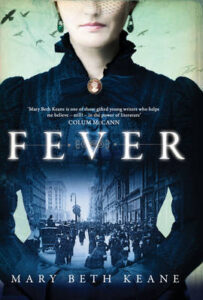 Fever, Mary Beth Keane
Fever, Mary Beth Keane
Fever is a novelisation of the life of Mary Mallon, the famous ‘Typhoid Mary’. It attempts to dig into why she didn’t stop cooking for people despite knowing the risks; it also tries to provide her with inner life and give the reader someone human to sympathise with. It works relatively well; Mary emerges as a hard-working woman who doesn’t want to believe that something she loves could be making people sick, who struggles with the idea that maybe she is to blame, who has to find a way to get along with the skills she has. It also includes other characters around her who support her and share her views, to remind us that this is a world where germ theory is in its infancy.
It mostly does a good job of making Mary sympathetic, though it has a tough job considering her carelessness. Sometimes she does come across as lacking empathy, and of being too intelligent to miss the implications of what’s happening — so it seems as if she’s stubbornly going through with something she knows is actually a bad idea, potentially dangerous for those around her.
The most emotionally engaging thread is perhaps that of her partner, Alfred. I don’t know how much basis in reality he has, but it provides some emotional handhold throughout the book. They have an on/off relationship as he struggles with addiction and she struggles with her diagnosis as a typhoid carrier. They’re separated and yet come together again and again; there’s something engaging in the way Mary slowly accepts what he is and just works with it, and something pathetic in the way her proudness is worn down.
It’s not very sympathetic to the medical community — Soper seems like a glory hound, for example, who hunts Mary for his own fame — but that’s probably to be expected considering this book tries to see things from Mary’s point of view.
Overall, I think it’s pretty successful, and the historical details seem to be right. It’s very easy to read; the style is relatively simple, but Mary’s voice is strong.

Leave a Reply